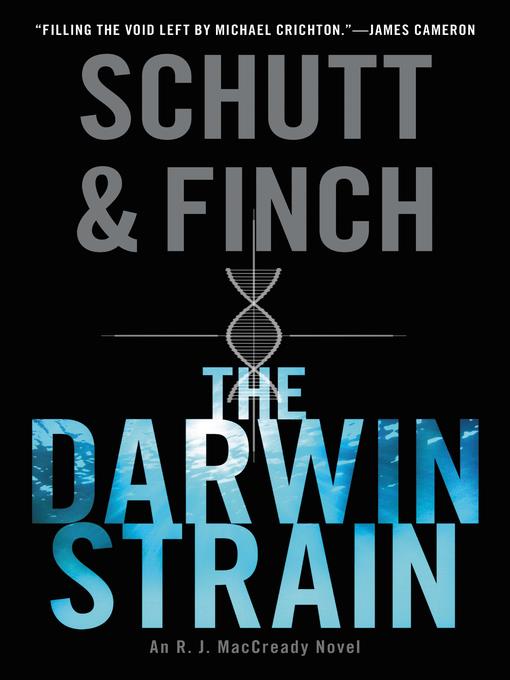
The Darwin Strain
An R. J. MacCready Novel
کتاب های مرتبط
- اطلاعات
- نقد و بررسی
- دیدگاه کاربران
نقد و بررسی

October 15, 2018
With the Cold War under way, crypto-zoologist R.J. MacCready and Yanni Thorne, an expert in animal behavior, have been directed by the Pentagon to investigate a volcanic spring on a Greek island that reputedly has healing powers. In fact, the spring contains a microbe that transforms life at lightning speed. Following Hell's Gate and The Himalayan Codex; with a 50,000-copy first printing.
Copyright 2018 Library Journal, LLC Used with permission.

Starred review from June 24, 2019
Set in 1948, Schutt and Finch’s excellent third cryptozoological thriller (after 2017’s The Himalayan Codex) takes American zoologist and operative R.J. MacCready to Greece to help his friend, real-life oceanographer Jacques Cousteau, who has an unsettling encounter with a terrifying something off the coast of the island of Santorini. While on a dive with two colleagues to explore the underwater caldera in the area known as the Devil’s Hole, Cousteau watches the two get torn apart by what looks like a black shimmering curtain. Cousteau escapes, but he’s arrested after the authorities don’t believe his cover story that a shark attacked his companions. MacCready manages to arrange Cousteau’s release, and together they find that a previously unknown life form, whose intelligence may rival that of humans, caused the deaths. The stakes rise when the Soviets take an interest in the discovery, which comes just as Cold War tensions are coming to a boil. A detailed and informative afterword lays out the historical and scientific background for the authors’ plausible speculations. Schutt and Finch are worthy successors of Michael Crichton. Agent: Gillian MacKenzie, Gillian MacKenzie Agency.

August 1, 2019
Man versus squid in a post-World War 2 mashup. Cryptozoologist R.J. MacCready has seen that red gunk before (in The Himalayan Codex, 2017), and he knows something about its properties: It can accelerate evolution, support health and recovery, and possibly even increase intelligence. Finding it in the caldera lagoon of Santorini in the Mediterranean is a little surprising, as it was last seen in the Nepalese mountains, but MacCready, Jacques Cousteau of scuba fame, and MacCready's "spooky" partner, Yanni Thorne, who can communicate with animals, are definitely the team to investigate this new manifestation. But there's a lot of competition for the miraculous goop: The Russians have caught a sniff of the substance, and Nora Nesbit, a rival researcher with ties to Gen. Douglas MacArthur, arrives to steal the thunder if she can. But the biggest competition comes from the creatures that flourish in the waters there. These are supersmart cephalopods, never specifically described as squid or octopus or cuttlefish, but eventually the text settles on "kraken," are able to communicate and plan coordinated actions, distinguish between good and not-so-good groups of people, and defend their territory. The red goop may have contributed to their evolutionary success, and in a subplot, the prehistory of the Mediterranean basin and the development of their culture are intertwined, providing a somewhat distracting quasi-scientific rationale for their success. While the U.S. factions struggle with each other, and both with the Russians, all three must contend with the cephalopods, who generally seem the most honorable and likable of the sides. Recurring characters MacCready and Yanni are unconvincing, and overall the whole enterprise is confusingly plotted and carelessly presented. It's too bad--smart squids, and especially octopuses, are rising stars in our appreciation of the natural world, and a controlled and affecting narrative featuring cephalopods would be a treat, but this isn't it. Murkier than squid ink and not as tasty.
COPYRIGHT(2019) Kirkus Reviews, ALL RIGHTS RESERVED.

August 1, 2019
The third in a planned trilogy (after Hell's Gate, 2016, and The Himalayan Codex, 2017) finds crypto-zoologist Captain R. J. MacCready and his colleague, indigenous Brazilian animal empath Yanni Thorne, taking off unexpectedly for the Greek island of Santorini in June 1948. Word is that red stuff, the mysterious microbe called the Darwin strain, which seems to cure illness and extend life, is spewing from a thermal vent in the nearby Mediterranean waters. There they confront not only Russians, also seeking the microbe, but also an unimaginable ancient enemy, the Kraken, huge shape-shifting, self-camouflaging cephalopods that display unusual intelligence. Intermittent flashbacks to 5.33 million BCE describe the hastened evolution of both bonobos and cephalopods as the result of being infected with the Darwin strain, while postwar tension between the U.S. and the Soviet Union has risen in the summer of 1948 as the narrative shifts between Santorini, Washington, and New York. An entertaining blend of science, history, and action, military and otherwise, with an author's note detailing the surprising amount of fact in this fiction, which may cause readers to never eat octopus again.(Reprinted with permission of Booklist, copyright 2019, American Library Association.)

























دیدگاه کاربران